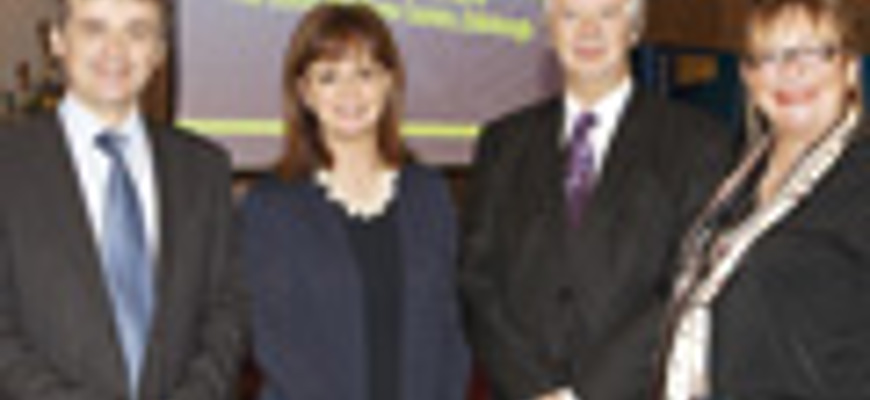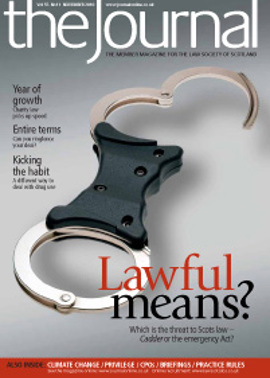Stand up and be counted

The impact of the Akzo Nobel decision on in-house lawyers featured prominently in the key speeches at this year's ILG annual conference on 29 October.
"In-house lawyers will have been discouraged by the decision," Lord Advocate Elish Angiolini QC declared in her address to open the conference. But, she added, "In-house lawyers are independent; we do owe professional standards and ideals."
From her perspective as a law officer, the Lord Advocate first discussed whether it was necessary for the Government's chief legal adviser to be a minister. It wasn't, she said, but there were good reasons for them to be one, as was the case in many countries.
"It is often said that the provision of legal advice is more effective coming from someone who understands the client's business. In-house lawyers will be well aware of that. Especially if the advice given is something the client doesn't want to hear."
It was profoundly important, she added, to make sure that ministers acted lawfully in accordance with the rule of law. As a US Supreme Court justice said in 1928, if the Government becomes a lawbreaker, it invites contempt for the law.
If the law officers take the view that a course of action is unlawful, ministers will not pursue it. "Otherwise we would have no option but to resign."
"We are all, Angiolini continued, members of a profession that requires to act independently and objectively. Arbitrariness and subjectivity are the antithesis of the law. Sometimes the answer really is no." And she commended Catriona Munro's article (Journal, October, 54) on the limits of the Akzo Nobel decision.
The Society's Vice President, Cammie Ritchie, himself a (recently retired) in-house lawyer, also made a point in his address of commenting on the case. "Some see this decision as an attack on the diversity of our profession, restricting legal privilege to only a limited number of practitioners and solicitor client relationships...
"Well, two things. First, Scots law on privilege remains unchanged. Privilege attaches to any demonstrable solicitor-client relationship.
"Secondly, there is the foreign dimension as expressed at this year's IBA conference. Foreign opinion, apart from some European jurisdictions, sees the decision as extremely restricted and unlikely to be extended in scope. Increasingly, the decision is being seen globally as perverse. However, globally, it is stressed that there is always a requirement to demonstrate robustly the solicitor-client relationship in in-house counsel dealings and ensure that advice is properly and independently documented."
He added: "The Society will continue to work through all available channels to defend the right of all its members to be involved in a solicitor-client relationship to which privilege attaches."
Ritchie spoke of his "huge pleasure and pride" in addressing the conference as Vice President; there had not been many who had become Society office bearers but he hoped there would be many more. He saw his role as continuing the work of creating and maintaining a unified profession despite its diversity, represented in the public interest by the Society.
After identifying the "common bond of professionalism" as the unifying factor both for the ILG and the wider profession, Ritchie paid tribute to the work of the Society's law reform team, which had also been his own preoccupation ever since taking office, culminating in the Cadder decision just a few days before. "We are sometimes accused of not having influence and not representing the profession," he said. "Many of our [committee] members who give much of their time to doing just that, would be mortally insulted by such an accusation."
He concluded by referring to the Society's governance and constitutional reviews, and the related independent review of the role of ILG and its relationship with the Society, which it is hoped to conclude by next summer. "We hope that once complete, this review will strengthen the bonds between ILG and the Society and give guidance as to how the needs of an increasingly diverse membership of ILG can be met with support."
"We are grateful for the support shown to in-house lawyers across the UK, by CBI, chambers of commerce and the UK law societies, who all recognise the value an in-house legal team brings to the workplace in terms of value for money, speed of service and understanding of their employers' business" – Janet Hood, in her Chairman's address
In this issue
- In the wee small hours
- Keeping the law in line
- Only a civil matter?
- Mapping the future
- Rights under question
- What help?
- Shunned lifelines
- The whole deal
- The limits of privilege
- Drugs: a user issue
- Law reform update
- Constitution out for views again
- Tackling bullying and harassment
- First registered paralegals confirmed
- Mediation lawyers can apply
- Look out for the rules reviews
- From the Brussels office
- Are they being served?
- Ask Ash
- Paper, pixel and process
- Check yourself
- Call for restraint
- A step back from compensation?
- Key to compliance
- Website review
- Resource issue
- Book reviews
- Stand up and be counted
- Cool drafting
- Partners in purchase






